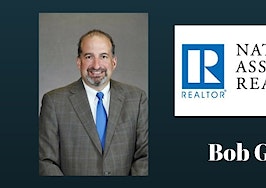- If you buy your insurance on the state or federal exchanges or are covered by Medicaid, you might be losing a tax credit or Medicaid coverage under the BCRA.
- If you were enrolling in a health care plan only when you needed it, you'll have to start waiting six months before your coverage kicks in.
- States would be allowed to decide what "essential benefits" are; this could lead to more choices, but it could also mean that in states where certain benefits are considered "nonessential," patients who need those benefits would once again be subject to annual or lifetime limits.
This week, the U.S. Senate plans to vote on the Better Care Reconciliation Act (BCRA), the latest legislative attempt to fix some of the problems with health care that drive up costs for both citizens and employers.
The bill has implications for everyone, including real estate agents. Here’s what you should know.
Why would more people be uninsured under BCRA?
One talking point that’s come from the Congressional Budget Office (CBO) and Joint Center on Taxation (JCT) analysis of the bill has to do with the number of people projected to have insurance in 2026 under this legislation compared to the current projections of insured citizens.
So if you’ve heard people say that 22 million Americans will be uninsured as a result of passing the BCRA, they are referring to the projection that this bill “would increase the number of people who are uninsured by 22 million in 2026 relative to the number under current law,” which is 28 million.
There are two essential reasons for this:
- One involves the advanced tax credit received by individuals or families at certain levels of the federal poverty level (FPL).
- The other involves Medicaid expansion.
The Patient Protection and Affordable Care Act (PPACA, ACA or Obamacare, colloquially) established state and federal health care exchanges where citizens could purchase insurance plans — and implemented tax credits for individuals or families who made up to 400 percent of the FPL to help them pay for those insurance plans. It also expanded access to Medicaid in 30 states by raising the eligibility cutoff to 138 percent of the FPL.
The BCRA will lower the tax credit threshold to 350 percent from 400 percent, and it also plans to phase out the ACA Medicaid expansion, starting in 2020 and ending in 2024. Those changes would collectively affect enough Americans that 22 million are projected to become uninsured by 2026.
Takeaway: If you or your family currently buy your insurance on the state or federal exchanges, or if you or your family are covered by Medicaid, then depending on where your income lies in relation to the FPL, you might be losing a tax credit or Medicaid coverage under the BCRA.
What would insurance look like for individuals under BCRA?
Mandates
The ACA established an insurance “mandate” — meaning that every citizen has to secure health insurance for himself or herself and any dependents. (This is similar in concept to the mandate that drivers secure auto insurance.) Employers with more than 50 full-time employees are mandated to offer affordable coverage to employees.
The BCRA would eliminate the annual financial penalties for not securing health insurance — but it’s also proposing a “lockout” period: Anyone who’s let their coverage lapse for 63 days or more will have to wait six months before obtaining insurance.
“People are coming in when they find out they need to have surgery and after a month they drop the insurance because paying the penalty is cheaper than paying the premium,” explained Susan L. Combs, founder of New York insurance brokerage Combs & Company and a PPACA Certified Expert, to Inman in March. This behavior helped drive up the cost of insurance.
The alternative penalty that the BCRA is proposing is a “lockout” period. The Senate bill would make those who had a lapse in coverage for 63 days or more wait six months before obtaining insurance. This is to help stabilize the insurance market and encourage healthy people to secure coverage, sooner rather than later.
Pre-existing conditions and age ratings
The ACA also set limits on what insurance companies can charge to different age groups and banned insurance companies from refusing to cover individuals who had a pre-existing health condition, which they were allowed to do prior to its passage.
The BCRA keeps the pre-existing condition requirements that the ACA outlined, but it allows insurance companies to charge significantly more to older citizens. In states where people are “rated” by age (that’s about 43 of them), the current ratio would be raised from 3:1 to 5:1.
“As an example,” Combs posted on Facebook, “the current maximum ratio is 3:1, so if an 18-year-old is paying $200/mo for health insurance, a 64-year-old can’t pay more than $600/mo. At a 5:1 ratio, the 64-year-old could be charged $1,000/mo.” This change would start in 2019, and individual states could decrease — or increase — the standard.
26-year-olds, lifetime limits and plan choices
After the ACA was passed, parents could keep kids on their insurance plans until age 26, and insurance plans were no longer allowed to establish “lifetime limits,” or caps on the amount of money they would pay out over the “lifetime” of a plan.
The BCRA would keep the age-26 allowance and would also continue the ban on lifetime limits — but there’s a loophole. Under the ACA, certain health care benefits are considered “essential,” and those essential health benefits apply nationwide:
- Ambulatory
- Emergency
- Hospitalization
- Maternity care
- Mental health and substance abuse
- Prescription drugs
- Rehabilitative and habilitative services
- Labs
- Preventative care
- Pediatric services
The BCRA would allow each state to define its own “essential benefits.” This could potentially increase the choices available to those shopping on the health care exchanges — a 40-year-old who was certain that catastrophic insurance would be sufficient might be able to purchase it, for example.
However, the CBO and JCT analysis pointed out that “the ACA’s ban on annual and lifetime limits on covered benefits would no longer apply to health benefits not defined as essential in a state.
“As a result, for some benefits that might be removed from a state’s definition of [essential health benefits] but that might not be excluded from insurance coverage altogether, some enrollees could see large increases in out-of-pocket spending because annual or lifetime limits would be allowed,” the report said.
Health savings accounts
Some real estate agents and brokers (like Teresa Boardman) use a health savings account (HSA). This is an account into which agents, brokers or other independent contractors “can deposit money earned, tax-free, and withdraw it without penalties throughout the year to pay for their health care costs,” Inman explained in March.
“It doesn’t offset my exorbitant insurance cost,” Boardman told us, but she stashes the maximum allowable amount in her HSA every year. “Especially last year, that ended up being a nice little tax break for me,” she said.
The BCRA would allow individuals to use their HSA money to pay for over-the-counter medications — like Tylenol or contact lens solution, noted Combs. It would also increase the total amount you can put in an HSA to:
- $6,550 for individuals (from $3,400)
- $13,100 for families (from $6,750)
Would costs go up or down?
The CBO and JCT analysis says that the BCRA would increase average premiums prior to 2020 and lower them after 2020.
This is an average and isn’t true across the board, the groups pointed out.
“Some people enrolled in nongroup insurance would experience substantial increases in what they would spend on health care even though benchmark premiums would decline, on average, in 2020 and later years,” they wrote. “Because nongroup insurance would pay for a smaller average share of benefits under this legislation, most people purchasing it would have higher out-of-pocket spending on health care than under current law.
“Out-of-pocket spending would also be affected for the people — close to half the population, CBO and JCT expect — living in states modifying the [essential health benefits] using waivers. People who used services or benefits no longer included in the [essential health benefits] would experience substantial increases in supplemental premiums or out-of-pocket spending on health care, or would choose to forgo the services.”
Takeaways:
- If you were enrolling in a health care plan only when you needed it, you’ll have to start waiting six months before your coverage kicks in.
- Insurance companies can’t refuse to insure people with pre-existing conditions.
- If you live in one of the 43 states with “age ratings,” you could have to pay significantly higher premiums for your insurance if you are in your 60s or your 50s.
- Parents can continue to keep kids on their insurance plans until age 26, and lifetime limits are still forbidden.
- States would be allowed to decide what “essential benefits” are — this could lead to more choices for individuals in different states, but it could also mean that in states where certain benefits are considered “nonessential,” patients who need those benefits would once again be subject to annual or lifetime limits.
- Agents and brokers who use HSAs will be able to use them for over-the-counter medication, and the HSA limits would increase.
- The CBO and JCT project that premium costs will increase before 2020 and decrease after 2020. The groups also project that about half the population could be affected by tweaks to the essential health benefits standards.
What would insurance look like for small businesses under BCRA?
The BCRA would create an option for small businesses to purchase insurance on the large group market through an association health plan.
The CBO and JCT analysis don’t address what this might mean for those businesses, but the Kaiser Family Foundation (KFF) reported that it could cause rate disruption — for many of the same reasons that the individual insurance market was disrupted.
The thought goes as follows: People (and companies) will only sign up for the bare minimum, and then might frantically try to find a better policy when something catastrophic happens. This is what individuals did by forgoing insurance until or unless they needed a procedure — and it caused significant problems for insurance companies trying to set rates.
KFF predicts that businesses will follow a similar pattern by signing up for policies that cover their healthy employees, then seeking a more robust policy “if an employee becomes ill or if the group wants more comprehensive benefits.
“This type of adverse selection could result in significant premium increases and instability in the small group market,” KFF said.
Takeaway: Small businesses would have an option to buy an “association” health plan; the behavior of those small businesses in the market could cause premium increases and instability, according to Kaiser Family Foundation.
What else should we know?
The ACA implemented some taxes in order to help pay for the bill — one of those taxes was a 3.8 percent tax on the net investment income of high-income taxpayers (individuals who make more than $200,000 or couples who make more than $250,000). The BCRA would repeal this tax (at least as written; there is also talk of keeping the investment tax in the bill, so this is something that could turn on a dime) — so if your high-net-worth clients are counting on a repeal of that investment income tax, this would be one to keep an eye on.
The bill would also “set up a $2 billion fund for substance treatment due to the opioid crisis,” Combs wrote on Facebook, and it defunds Planned Parenthood for one year.
“People will hopefully be able to buy the insurance and coverages they really want” if the BCRA passes, she told Inman — but that also means that any agents and brokers shopping on state or federal exchanges need to be extremely aware of what they’re buying.
“They need to not get complacent and think all the stuff is going to be covered now that was covered before,” she noted. “They need to become more educated consumers and know what they’re buying if this bill comes to fruition.”












